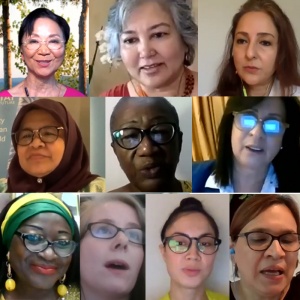Imagine a Post-COVID-19 City with Women’s Human Rights
Side event to the High Level Political Form
On 9 July, the Feminist and Women’s Movement Action Plan (fwMAP) with co-sponsors Center for Women’s Global Leadership (CWGL), NGO CSW/NY and WEDO held a webinar with the title “Imagine a Post-COVID-19 City with Women’s Human Rights.”
The theme was “Accelerated Action and Transformative Pathways Realizing the Decade of Action and Delivery for Sustainable Development.” The panel challenged listeners to “imagine how to build resilience to address crisis, make sure womenis leadership is in plance and puts feminist and women’s movements’ aspirations into local action.”
UN Representative for the International Alliance of Women Soon-Young Yoon and CWGL Executive Director Krishanti Dharmaraj served as moderators.
“Post-COVID will come and the question is can we rebuild ecosystems that will sustain human health and livelihoods starting bottom up, remembering by 2050 or so, more than 75% of humanity is expected to live in cities,” said Soon-Young Yoon.
Maimunah Mohd Sharif (interviewed by Rick Smith), Khara Jabola-Carolus, Bridget Burns, Patricia Cortes, Vera Baboun, Clara Mavogo, Celestine K Courtes, and Melissa Upreti were the panelists.
More than 700 participants registered for the event who were able to participate in polling. The first such poll the participants “What is your priority to seize the moment for a feminist recovery plan for cities?” The choices were Universal health care or coverage, Ensure social protection for all and Climate justice. The results were 22% for Universal health coverage, 12% chose Climate justice and 67% in the meeting chose Ensure social protection for all.
Those who were unable to enter the Zoom room watched via Youtube. Aside from the US, participants in the meeting came from Canada, Trinidad and Tobago, Nigeria, Brazil, Georgia, Philippines and other countries.
“Women know what the problems are. Women know what the solutions are. Where we are lagging behind, where the greatest challenge is, we don’t have the level of institutional power in all scales that we need to make the transformation. We have made progress over the years. The question is not what the change needs to be, but it is how,” said Melissa Upreti, Vice Chair, UN Working Group on Discrimination Against Women and Girls, a Special Procedure of the Human Rights Council.
Watch the recording of the meeting here:








